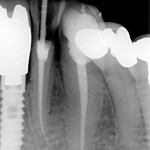
Managing post-operative endodontic symptoms is an important priority for patients and clinicians with studies reporting between 3-58% experiencing pain. Occlusal reduction and pharmaceutical approaches including the use of antibiotics have been tested and a previous review (Aminoshariae and Kulild, 2015) indicated that the use of systemic antibiotics generally was not indicated during endodontic treatment to alleviate pain or decrease the presence of infection.
The aim of this review was to assess the efficacy of prophylactic oral antibiotics in the management of post-operative endodontic symptoms in adults with necrotic pulp.
Methods
Searches were conducted in the Medline/PubMed, Cochrane Library, Scopus, Science Direct, Embase, ProQuest Dissertations and Theses database, and Google Scholar databases. randomised controlled trials (RCTs) involving primary root canal treatment in permanent teeth comparing use of pre- post-operative antibiotics with placebo were considered. Two reviewers independently screened studies, abstracted data and assessed methodological quality using the Cochrane risk of bias tool. The outcomes included, endodontic pain, swelling or combined pain with swelling up to 72-hours. Standardised mean differences (SMDs) and 95% confidence intervals (CIs) were used for continuous variables.
Results
- 10 RCTs involving 1161 patients were included
- 2 studies were considered to be at low risk of bias, 2 at unclear risk and 6 at high risk of bias
- 8 RCTs (690 patients) assessed the effects of antibiotics on post-operative endodontic pain
- 4 RCTs (211 patients) reported on post-operative swelling.
- 5 RCTs (350 patients) reported on post-operative pain and swelling.
- 8 RCTs contributed to the meta-analyses there were no significant difference for pain or swelling at any of the follow up times for patients receiving antibiotics compared with placebo (see table).
| Time post-op | Pain- SMD (95%CIs) | Swelling – SMD (95%CIs) |
| 6hrs | -0.27 (-0.008 to 0.26) | – |
| 12hrs | −0.2 (−1.24 to 0.83) | – |
| 24hrs | −0.04 (−0.29 to 0.20) | 0.29 ( −0.72 to 0.57) |
| 48hrs | 0.18 (−0.26 to 0.62) | −0.23 (−0.98 to 0.51) |
| 72hrs | −0.05 (−0.33 to 0.23) | −0.03 (−1. 25 to 1.33) |
Conclusions
The authors concluded: –
The present study provides moderate quality evidence and showed that there is no superiority in using adjunctive antibiotics for the prevention of post-operative endodontic symptoms in patients with necrotic teeth.
Comments
A noted earlier a 2015 review by Aminoshariae and Kulild found no evidence to support the prescribing of ‘antibiotics preoperatively or postoperatively to prevent endodontic infection or pain unless the spread of infection is systemic, the patient is febrile, or both.’ And that, ‘an accurate diagnosis coupled with effective endodontic treatment will decrease microbial flora enough for healing to occur. These findings of this new review support those of the earlier review. Although many of the included studies are small and only two are considered to be at low risk of bias the meta-analysis does add some additional support. So currently root canal treatment supported by appropriate analgesics support should be sufficient for the vast majority of endodontic cases.
Links
Primary Paper
Shamszadeh S, Asgary S, Shirvani A, Eghbal MJ. Effects of antibiotic administration on post-operative endodontic symptoms in patients with pulpal necrosis: A systematic review and meta-analysis. J Oral Rehabil. 2021 Mar;48(3):332-342. doi: 10.1111/joor.13057. Epub 2020 Oct 9. PMID: 32681652.
Other references
Aminoshariae A, Kulild JC. Evidence-based recommendations for antibiotic usage to treat endodontic infections and pain: A systematic review of randomized controlled trials. J Am Dent Assoc. 2015 Dec 24. pii: S0002-8177(15)01097-1. doi: 10.1016/j.adaj.2015.11.002. [Epub ahead of print] Review. PubMed PMID: 26724957.
Dental Elf – 4th Nov 2019
Dental Elf – 31st Jan 2020
